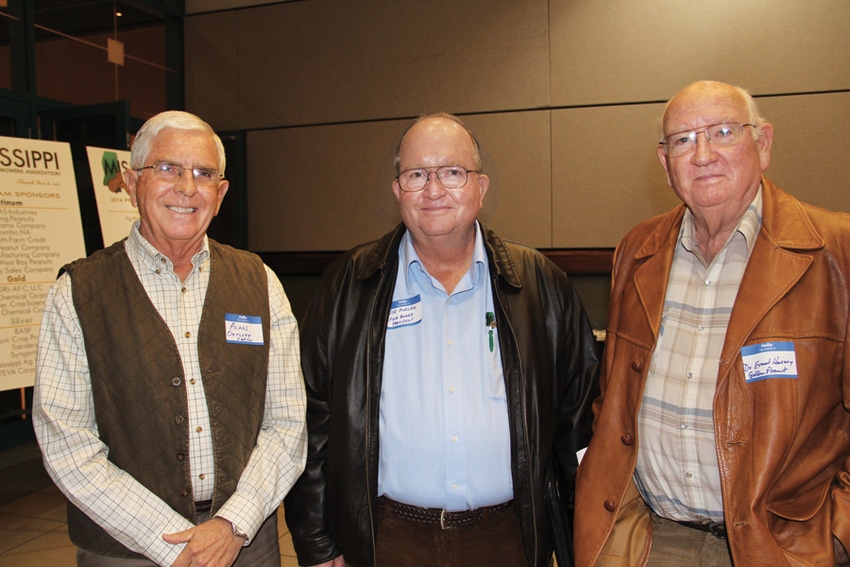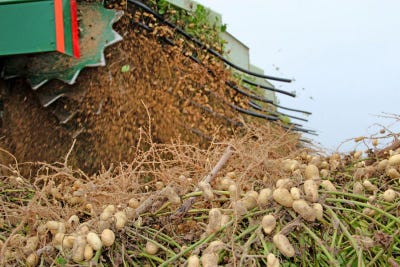
While the Southeast’s standard variety, Georgia-06G, has consistently stood out among highest yielders, two Florida high oleic varieties have also performed well in Mississippi trials, says Jason Sarver, Mississippi Extension peanut agronomist. “These varieties may not work on all your acres," he says, "but I think there are situations in which you may find it profitable to give these varieties a shot.”

Mississippi peanut variety trial results from the last two years offer the state’s growers some options when deciding what to plant, says Jason Sarver, Mississippi’s new Extension peanut agronomist, who spoke at the annual meeting of the Mississippi Peanut Growers Association.

JASON SARVER
While the Southeast’s standard variety, Georgia-06G, has consistently stood out among highest yielders, two Florida high oleic varieties have also performed well in Mississippi trials, Sarver says.
“Florida-07 and TufRunner 727 really jump out,” he says. “Averaged over five locations, they yielded equally to GA-06G. Some growers have tried the high-oleic varieties and have returned to GA-06G.
“These varieties may not work on all your acres, but I would encourage you to give them a trial on at least some of your acres — particularly if the premiums being offered for these high oleic varieties continue. I think there are situations in which you may find it profitable to give these varieties a shot.”
Two years of data from trials for four varieties showed FL-07 performing well, Sarver says. “GA-06G averaged 5,080 pounds; GA-07W averaged 4,616 pounds; GA-09B averaged 4,619 pounds; and FL 07 averaged 4,989 pounds per acre. With the high-oleic price premium, there is potential to make extra money on FL-07 at those yields.”
In addition to these varieties, Sarver says, two new varieties, Georgia 12Y and Georgia 13M, are showing early promise in Georgia research trials.
“Preliminary data show Georgia-12Y to be very high yielding,” he says, “even when compared to GA-06G. Grades were slightly lower than those for GA-06G. Georgia-13M is high-yielding and grades well, but unlike GA-12Y is high-oleic. Both are smaller-seeded than GA-06G.
AG NEWS delivered daily to your inbox: Subscribe to Delta Farm Press Daily
“If early results from Georgia are an indication of large-scale success, this variety has the potential for satisfying the needs of all segments of the peanut industry — including processors and peanut buyers who want the high-oleic oil chemistry along with a smaller seed size, as well as growers who have experienced a yield and economic hit with some of the current high-oleic varieties in some situations.”
While seed is limited at this time, Sarver plans to work in conjunction with Brad Burgess and the MSU variety testing program to include these varieties in the 2014 Mississippi variety trials. 
“We want to determine their viability across the state when compared to current standards,” he says. “Mississippi farmers have proven that they can grow peanuts well and profitably, and with high-performing varieties we’ve got a lot of potential to be a big player in the peanut world.
“We need to know how these varieties will perform in our state, so when seed becomes available on a large scale we will have the necessary information to make the best possible management decisions.”
In other research he has planned, Sarver says, “We want to do some long term rotation studies of peanuts with different crops, including soybeans, and different disease control protocols, planting dates, varieties, and row patterns.
“We’re also going to be doing work with various inoculant formulations. Inoculants are going to be important in Mississippi, especially as new ground is put into production — even on ground that has previously been in peanuts, they can be a relatively inexpensive insurance policy.
“We’ll be doing work with gypsum products and rates, cultivar viability, seed quality, growth regulators, and harvest dates, and our variety trials will not only continue but expand.
“Our efforts as a peanut research and Extension team will also improve through collaborative disease work with Dr. Alan Henn, and insect work with Dr. Jeff Gore. Our ultimate goal is to use our research and Extension efforts to establish a base of recommendations specific to Mississippi and to enhance production and profitability for the state’s peanut growers.”
About the Author(s)
You May Also Like



